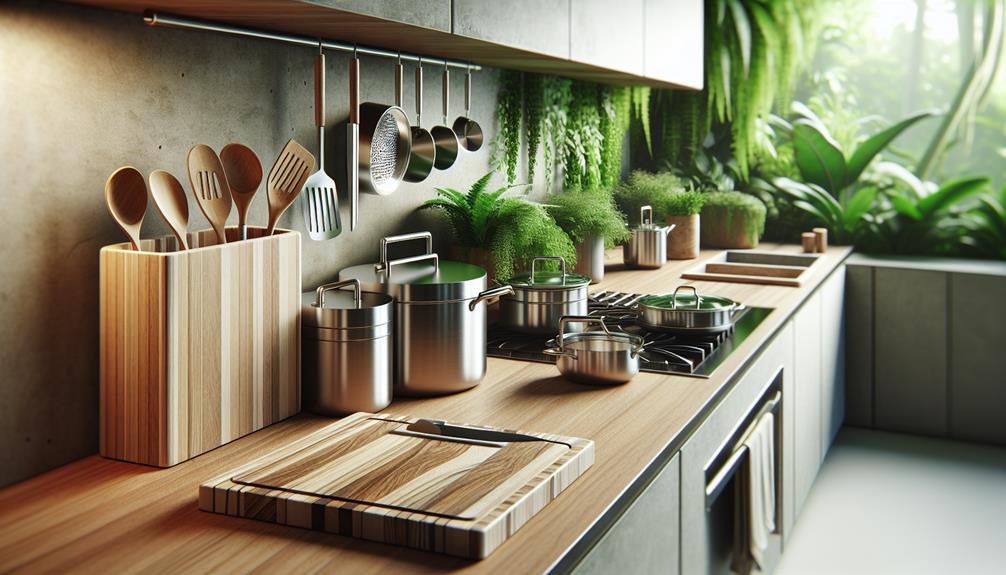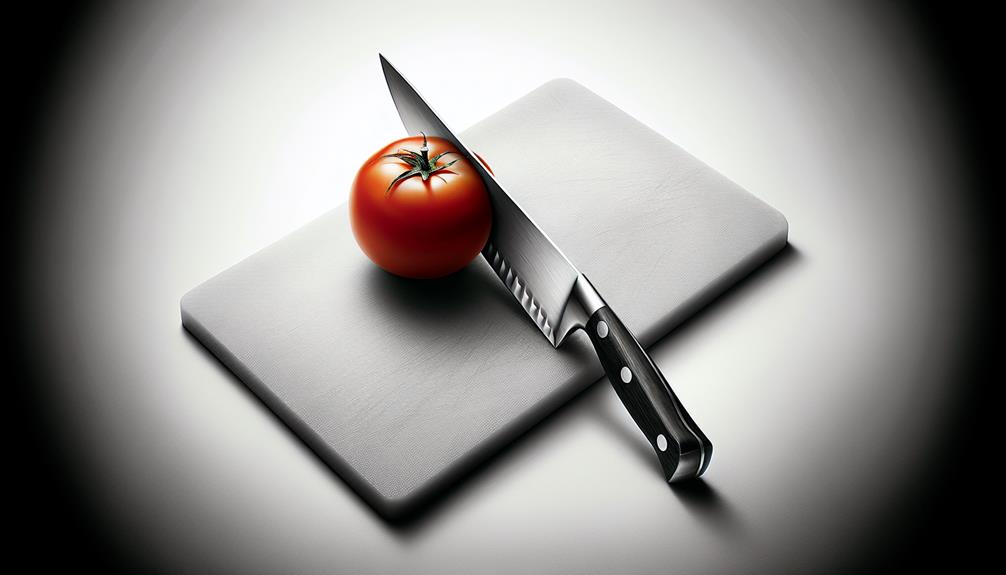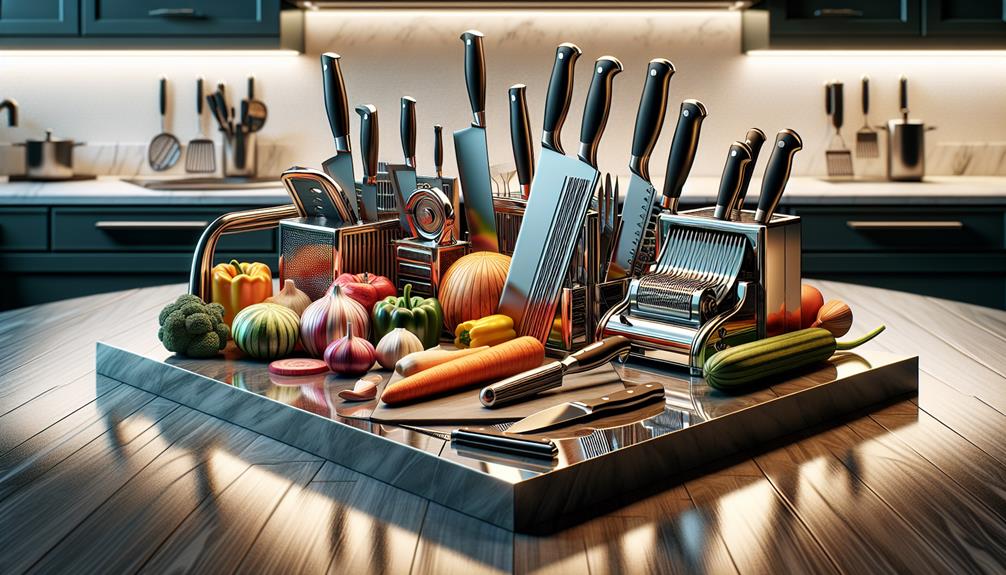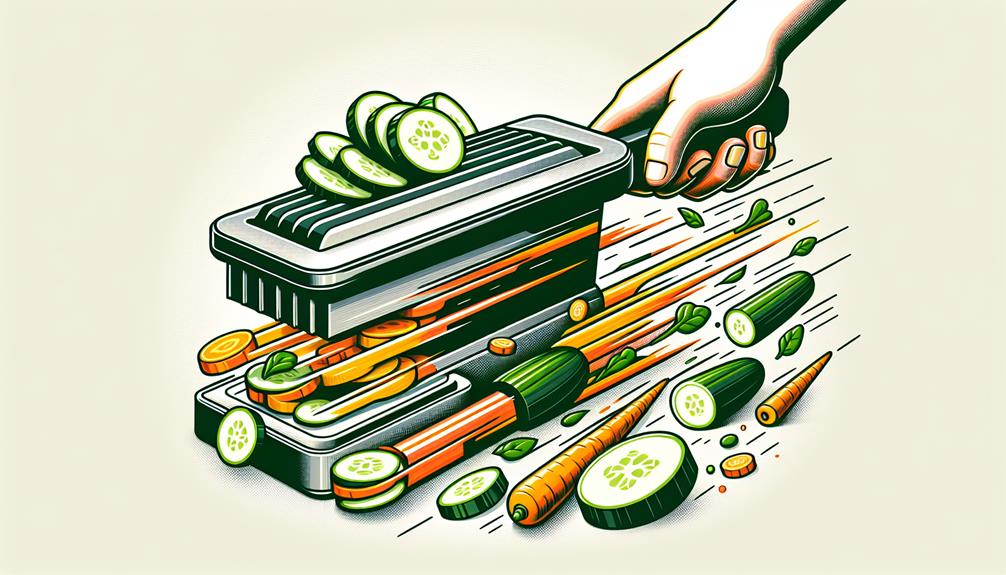As you stand in your kitchen, surrounded by tools and utensils, you might not think twice about the materials they're made of. But the truth is, the traditional plastics and synthetics that dominate the industry are taking a toll on the planet. That's why you're likely to start noticing a shift towards sustainable materials in the kitchen tools you use every day. From mushroom-based composites to seaweed-derived utensils, the options are endless – and they're changing the game. But what makes these materials so revolutionary, and how will they impact the way you cook and think about the environment?
Eco-Friendly Alternatives to Plastic
As you start to rethink your kitchen tools, consider swapping out plastic utensils for eco-friendly alternatives that not only reduce waste but also bring a touch of natural elegance to your cooking space. You'll be surprised at the innovative materials being used to create sustainable kitchen tools. For instance, mushroom composites are being used to create durable and lightweight utensils that are biodegradable and compostable. These composites are made by combining mushroom mycelium with agricultural waste, creating a strong and flexible material.
Another sustainable material gaining popularity is seaweed. Seaweed materials are being used to create a range of kitchen tools, from cutting boards to utensils. Seaweed is a highly renewable resource that requires minimal energy to harvest and process. It's also naturally antimicrobial, making it perfect for kitchen use. By choosing eco-friendly alternatives like mushroom composites and seaweed materials, you'll be reducing your environmental footprint and adding a touch of natural style to your kitchen. Plus, these materials are often more durable and long-lasting than traditional plastic utensils, making them a practical choice for the modern home cook.
Bamboo's Rise in Kitchen Utensils
You're likely familiar with bamboo's popularity in sustainable building materials, but it's also making a significant impact in kitchen utensils, offering a durable, lightweight, and highly renewable alternative to traditional materials. With a rich Bamboo History dating back thousands of years, this ancient plant has been used in various applications, from furniture to textiles. In recent years, bamboo has gained traction in kitchen utensils, and for good reason. Bamboo Farming is a highly sustainable practice, requiring minimal water and pesticides, making it an attractive option for eco-conscious consumers.
Bamboo kitchen utensils, such as cutting boards, spoons, and spatulas, are not only eco-friendly but also incredibly durable. They resist scratches and cracks, and their natural antimicrobial properties make them resistant to bacteria growth. Plus, bamboo is lightweight, making it easy to handle and maneuver. As consumers become more environmentally aware, the demand for sustainable kitchen tools is on the rise, and bamboo is poised to take center stage. With its unique combination of durability, sustainability, and versatility, bamboo is revolutionizing the way we cook and prepare meals.
Stainless Steel's Sustainable Edge
Stainless steel, a stalwart in modern kitchens, boasts a sustainable edge that's often overlooked, yet it's precisely this eco-friendly aspect that makes it an attractive alternative to traditional cookware materials. When you choose stainless steel kitchen tools, you're investing in durability and longevity. Its corrosion resistance guarantees that your cookware will withstand the test of time, reducing the need for frequent replacements and the subsequent waste that comes with them.
You'll also appreciate the energy efficiency of stainless steel cookware. It's an excellent heat conductor, allowing you to cook at lower temperatures and reduce your energy consumption. This not only helps the environment but also saves you money on your utility bills. Additionally, stainless steel is 100% recyclable, making it a closed-loop material that can be reused and repurposed at the end of its life cycle. By incorporating stainless steel kitchen tools into your daily cooking routine, you're taking a significant step towards reducing your environmental footprint.
The Future of Silicone Cookware
In the quest for sustainable kitchen tools, silicone cookware emerges as a strong contender, offering a unique blend of flexibility, durability, and eco-friendliness that's set to revolutionize the way you cook. You'll appreciate the silicone's ability to withstand extreme temperatures, from -40°C to 260°C, making it an ideal material for cookware. This heat resistance guarantees that your silicone pots, pans, and utensils remain safe to use, even when exposed to high heat.
Silicone's durability is another significant advantage. Unlike traditional cookware materials, silicone is resistant to scratches, cracks, and chips. It's also non-stick, making food release and cleaning a breeze. Additionally, silicone cookware is often dishwasher safe, reducing your water and energy consumption. As you explore the world of silicone cookware, you'll find a wide range of products, from silicone-coated frying pans to silicone-based baking mats. With its impressive durability and heat resistance, silicone cookware is poised to become a staple in your eco-friendly kitchen. You'll be cooking up a storm, while minimizing your environmental footprint.
Recycled Metal in Modern Tools
Sixty percent of modern kitchen tools now incorporate recycled metal, reducing the environmental impact of manufacturing and providing a guilt-free cooking experience. You're probably wondering how this shift towards sustainability affects the quality of your kitchen tools. The good news is that recycled metal doesn't compromise on performance. In fact, upcycled craftsmanship has led to the creation of durable, long-lasting tools that can withstand the rigors of daily cooking.
When it comes to metal sourcing, manufacturers are getting creative. They're using post-consumer waste, such as old appliances and machinery, to craft new kitchen tools. This closed-loop system minimizes waste and conserves natural resources. You can feel good about using a whisk or spatula made from recycled metal, knowing that you're supporting a more circular economy. The best part? Recycled metal tools are often indistinguishable from their traditional counterparts, so you won't have to sacrifice style or functionality for sustainability. By choosing kitchen tools made from recycled metal, you're doing your part to reduce waste and promote eco-friendly practices in the kitchen.
Natural Fibers in Kitchen Essentials
As you shift your focus to natural fibers in kitchen essentials, you'll discover a world of eco-friendly options that'll make you rethink your cooking habits. You'll learn how bamboo utensils offer a sustainable alternative to traditional materials, and how hemp cloth's durability makes it perfect for kitchen tasks. You'll also explore the benefits of coconut shell products, which bring a touch of nature to your cooking space.
Bamboo Utensil Advantages
You'll appreciate the numerous benefits of switching to bamboo utensils, which offer a natural, non-toxic, and highly durable alternative to traditional kitchen tools. Bamboo's unique properties make it an ideal material for kitchen essentials. The bamboo craftsmanship involved in creating these utensils guarantees a high-quality finish that's both aesthetically pleasing and functional. In addition, bamboo's natural resistance to pests and decay means you won't have to worry about it harboring bacteria or other microorganisms.
Bamboo's sustainability is another significant advantage. Forest harvesting practices used to source bamboo are carefully regulated to protect the ecosystem. This means that by choosing bamboo utensils, you're supporting environmentally responsible forestry practices. Also, bamboo requires minimal water and pesticides to grow, reducing its carbon footprint even further. With bamboo utensils, you can cook with confidence, knowing you're not only preparing healthy meals but also doing your part for the planet.
Hemp Cloth Durability
Moving beyond the benefits of bamboo, hemp cloth emerges as another natural fiber that's gaining traction in the kitchen, offering a remarkable level of durability that's hard to ignore. When you compare hemp cloth to traditional cotton, you'll find that hemp has a substantially longer lifespan. This is due to its unique weaving pattern, which creates a dense and resistant fabric. Hemp weaving is a labor-intensive process that requires great skill, but the end result is well worth it. The tight weave of hemp cloth makes it more resistant to tears and scratches, ensuring that your kitchen tools will last longer.
You'll also notice that hemp cloth is more resistant to water and stains, making it a practical choice for kitchen utensils and accessories. Unlike cotton, which can absorb spills and stains, hemp cloth repels them, making cleanup a breeze. This means you can focus on cooking up a storm without worrying about the mess. With its impressive durability and practicality, hemp cloth is an excellent choice for sustainable kitchen tools.
Coconut Shell Benefits
What makes coconut shells an attractive alternative to traditional materials in kitchen essentials is their unique combination of strength, sustainability, and natural antimicrobial properties. You'll appreciate the durability of coconut shells, which can withstand the rigors of daily use in your kitchen. Additionally, coconut shells are a sustainable resource, reducing waste and supporting eco-friendly practices. The natural antimicrobial properties of coconut shells also guarantee that your kitchen tools remain clean and hygienic.
Coconut craftsmanship has evolved substantially, allowing for the creation of beautiful and functional kitchen tools. You can find coconut shell utensils, bowls, and even decorative items that add a touch of natural elegance to your kitchen. The shell aesthetics are undeniable, with unique patterns and textures that add character to your kitchen essentials. As you explore the world of coconut shell kitchen tools, you'll discover a range of innovative designs that not only look great but also promote sustainability. By choosing coconut shell kitchen tools, you're supporting a more environmentally friendly approach to cooking and food preparation.
Bioplastic Innovations in Cooking
Bioplastic innovators are revolutionizing cooking by creating eco-friendly alternatives to traditional plastic utensils and tools. You're likely familiar with the environmental concerns surrounding plastic waste, and these innovators are tackling the issue head-on. By developing microbe-based bioplastics, they're using microorganisms to break down organic matter and convert it into a usable material. This approach reduces greenhouse gas emissions and creates a biodegradable product that can replace traditional plastics.
Plant-derived bioplastics are another area of focus. You might be surprised to learn that plants like corn starch, sugarcane, or potato starch can be converted into bioplastic materials. These plant-based bioplastics are compostable, non-toxic, and require less energy to produce than traditional plastics. Imagine cooking with utensils made from cornstarch or sugarcane – it's a reality that's becoming increasingly possible. As you explore the world of bioplastic innovations, you'll discover a growing range of sustainable kitchen tools that not only reduce waste but also promote a healthier planet.
Frequently Asked Questions
Are Sustainable Kitchen Tools More Expensive Than Traditional Ones?
You might think sustainable kitchen tools break the bank, but they're not always pricier. While some eco-friendly options come with a premium perception, you'll find the cost tradeoff is often worth it in the long run, considering their durability and reduced waste.
Can I Put Bamboo Utensils in the Dishwasher?
You're wondering if bamboo utensils can handle the dishwasher. Generally, it's not recommended, as high heat can compromise bamboo's durability. However, if your utensils are specifically designed with heat resistance, you might get away with it, but check the manufacturer's guidelines first.
Are Stainless Steel Kitchen Tools Recyclable at End-Of-Life?
You're wondering if stainless steel kitchen tools are recyclable at end-of-life. Yes, they are! Most steel recycling facilities accept stainless steel, but design limitations might affect the process.
Do Natural Fibers in Kitchen Tools Absorb Flavors and Odors?
You're wondering if natural fibers in kitchen tools absorb flavors and odors? Well, it's true that fibers like bamboo and wood have porous properties, which can absorb flavors and odors, highlighting material limitations with regard to fiber properties.
Are Bioplastics Compostable at Home or Only Industrially?
You're wondering if bioplastics can be composted at home or only industrially. Typically, they require industrial composting, but some bioplastics can break down at home, depending on microbe impact and soil quality, which affect the decomposition process.
Conclusion
As you step into the kitchen of the future, you'll find tools that not only make cooking easier but also help save the planet. The sustainable materials revolution is in full swing, and it's up to you to join in. By choosing eco-friendly kitchen tools, you're supporting a movement that's redefining the way we cook and live. So, go ahead, make the switch, and indulge in a guilt-free cooking experience that's good for you and the environment. When you make the switch to eco-friendly kitchen tools, you are not only reducing your environmental footprint, but you are also reaping the benefits of using kitchen wipes made from sustainable materials. These wipes are not only effective at cleaning up messes, but they also biodegrade quickly and are often made from renewable resources. By choosing these eco-friendly options, you are not only contributing to a healthier planet, but you are also creating a healthier living space for yourself and your family.





